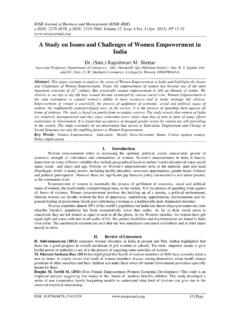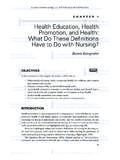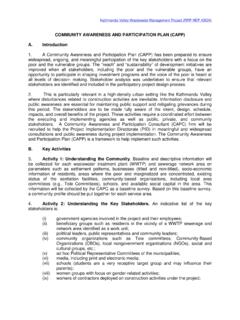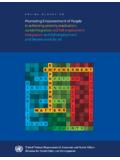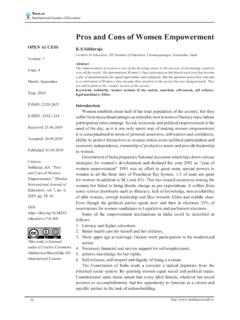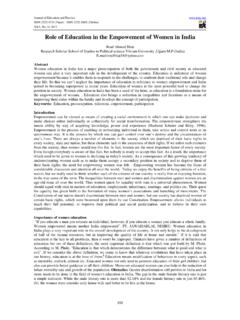Transcription of Process of Empowerment - John Lord
1 The Process of Empowerment : Implications for Theory and Practice John Lord and Peggy Hutchison Published in Canadian Journal of Community Mental Health 12:1, Spring 1993, Pages 5-22. _____ Both authors were involved in the Empowerment Research Project at the Centre for Research & Education. This ongoing research was partially funded by the Secretary of State, Government of Canada and the Scottish Rite Foundation. This article is based on a series of Empowerment studies completed at the Centre. Some of this data has also been published as Lives in Transition: The Process of Personal Empowerment , a monograph which is available from the Centre (73 King St. West, Suite 300, Kitchener, Ont. N2G 1A7). Process of Empowerment Lord & Hutchison 2 The Process of Empowerment : Implications for Theory and Practice INTRODUCTION The concept of Empowerment is of increasing interest to researchers, practitioners and citizens concerned about mental health issues.
2 In some respects, Empowerment is a new buzzword. As Edelman (1977) has noted in relation to language and the politics of human services, sometimes new language is used to describe the same old practices. Others believe that Empowerment language can actually lead to raised awareness (Rappaport, 1986). Regardless, a growing number of people are searching to understand the meaning of Empowerment and ways it can be used to change their settings and lives. Empowerment can begin to be understood by examining the concepts of power and powerlessness (Moscovitch and Drover, 1981). Power is defined by the Cornell Empowerment Group as the "capacity of some persons and organizations to produce intended, foreseen and unforeseen effects on others" (Cornell Empowerment Group, 1989, ). There are many sources of power. Personality, property/wealth, and influential organizations have been identified by Galbraith (1983) as critical sources of power in the last part of this century.
3 Others have pointed out that the class-dominated nature of our society means that a small number of people have vast economic or political power, while the majority have little or none (Moscovitch & Drover, 1981) At the individual level, powerlessness can be seen as the expectation of the person that his/her own actions will be ineffective in influencing the outcome of life events (Keiffer, 1984). Lerner (1986) makes a distinction between real and surplus powerlessness. Real powerlessness results from economic inequities and oppressive control exercised by systems and other people. Surplus powerlessness, on the other hand, is an internalized belief that change cannot occur, a belief which results in apathy and an unwillingness of the person to struggle for more control and influence. Powerlessness has, over the years, come to be viewed as an objective phenomenon, where people with little or no political and economic power lack the means to gain greater control and resources in their lives (Albee, 1981).
4 As an illustration of powerlessness, Asch (1986) has noted that generally people with disabilities; Process of Empowerment Lord & Hutchison 3 .. have so internalized the general negative attitudes towards them because of their disabilities that they cannot believe that collective action can improve their lives. They have seen the problems as inherent in their medical conditions and have not been urged to join others to demand structural changes that would render the environment useful for them. (p. 13) Most of the literature also associates Empowerment with personal control. Rappaport (1987) points out that "by Empowerment I mean our aim should be to enhance the possibilities for people to control their own lives" (p. 119). Cochran (1986) believes that people understand their own needs far better than anyone else and as a result should have the power both to define and act upon them. The Ottawa Charter for Health Promotion notes that "people cannot achieve their fullest health potential unless they are able take control of those things which determine their health" (World Health Organization, Health and Welfare Canada, & Canadian Public Health Organization, 1986, p.)
5 1). Increasingly, Empowerment is being understood as a Process of change (Cornell Empowerment Group, 1989). McClelland (1975) has suggested that in order for people to take power, they need to gain information about themselves and their environment and be willing to identify and work with others for change. In a similar vein, Whitmore (1988) defines Empowerment as: an interactive Process through which people experience personal and social change, enabling them to take action to achieve influence over the organizations and institutions which affect their lives and the communities in which they live. ( ) Keiffer's (1984) work on personal Empowerment is one of the only major empirical studies which examines personal Empowerment as a Process . He labels Empowerment as a developmental Process which includes four stages: entry, advancement, incorporation, and commitment. The entry stage appears to be motivated by the participant's experience of some event or condition threatening to the self or family, what Keiffer refers to as an act of 'provocation'.
6 In the advancement stage, there are three major aspects which are important to continuing the Empowerment Process : a mentoring relationship; supportive peer relationships with a collective organization; and the development of a more critical understanding of social and political relations. The central focus of the third stage appears to be the development of a growing political Process of Empowerment Lord & Hutchison 4 consciousness. Commitment is the final stage - one in which the participants apply the new participatory competence to ever expanding areas of their lives. According to Wallerstein (1992), Empowerment is a social-action Process that promotes participation of people, organizations, and communities towards the goals of increased individual and community control, political efficacy, improved quality of community life, and social justice. While Whitmore (1988) feels the concept of Empowerment needs to be more clearly defined, she states that there are some common underlying assumptions: a) individuals are assumed to understand their own needs better than anyone else and therefore should have the power both to define and act upon them.
7 B) all people possess strengths upon which they can build. c) Empowerment is a lifelong endeavor. d) personal knowledge and experience are valid and useful in coping effectively. For the purpose of this study, Empowerment was defined as processes whereby individuals achieve increasing control of various aspects of their lives and participate in the community with dignity. Rappaport's (1987) concept of Empowerment , "conveys both a psychological sense of personal control or influence and a concern with actual social influence, political power and legal rights" ( ). In this sense, Empowerment can exist at three levels: at the personal level, where Empowerment is the experience of gaining increasing control and influence in daily life and community participation (Keiffer, 1984); at the small group level, where Empowerment involves the shared experience, analysis, and influence of groups on their own efforts (Presby,Wandersman, Florin, Rich, & Chavis, 1990); and at the community level, where Empowerment revolves around the utilization of resources and strategies to enhance community control (Labonte, 1989).
8 Process of Empowerment Lord & Hutchison 5 While this current study was focused primarily on the personal level, it is important to note that it is difficult to clearly separate the three levels of Empowerment ; indeed, the three levels are highly interactive. Understanding individual change and Empowerment informs community Empowerment strategies and policy and vice versa. As a result, it is important that research on Empowerment begin with an understanding of individuals, not in a clinical sense, but in an experiential sense (Lord, 1991). This means that understanding Empowerment is complex and ecological. This study on Empowerment looked at the "person in the environment" by trying to understand the lived experience of citizens in relation to family, groups, and other aspects of community life. PURPOSE OF THE RESEARCH The purpose of the research was to understand the Process of personal Empowerment as experienced by individuals who were currently involved in the struggle to become empowered.
9 Specifically, the goals of the study were to: 1. document the participants' early and current experiences of devaluation and powerlessness in their personal, social, and community lives. 2. explore the transition from powerlessness to Empowerment , including personal qualities, experiences, and elements which people indicated were helpful to them as they gained more control and increased participation in their lives. 3. analyze the meaning of people's life experiences, both of powerlessness and the Empowerment Process . METHODS Forty-one men and women who had experienced extensive powerlessness in their lives were selected as the research participants. Using qualitative interviews, this study was designed to understand participants' lived experience "from their own point of view", as they struggled to reduce personal powerlessness and dependency. This qualitative approach (Guba & Lincoln, 1989; Lord, Schnarr, & Hutchison, 1987; Patton, 1990) has provided an in-depth examination of the Process of people's transition toward increased control in their lives.
10 Process of Empowerment Lord & Hutchison 6 The research team used four main approaches to study the Process of personal Empowerment : an extensive literature review; interviews with a number of key informants; in-depth biographical interviews with people who had experienced extensive powerlessness in their lives; and focused group interviews in order to gain further reflections on the initial findings from the biographical interviews (de Boer, 1992; Lord, 1991). Participants Key informants. Eight key informants, four women and four men, came from several different areas such as the disability movement, the health promotion field, and human services. All the key informants were people with a vast array of experience and leadership who were assumed to have a strong sense of the meaning of personal Empowerment . The ideas expressed by these individuals were used to assist the researchers in sorting out issues and concepts related to Empowerment .
